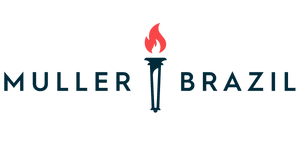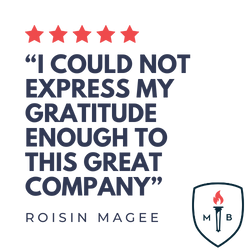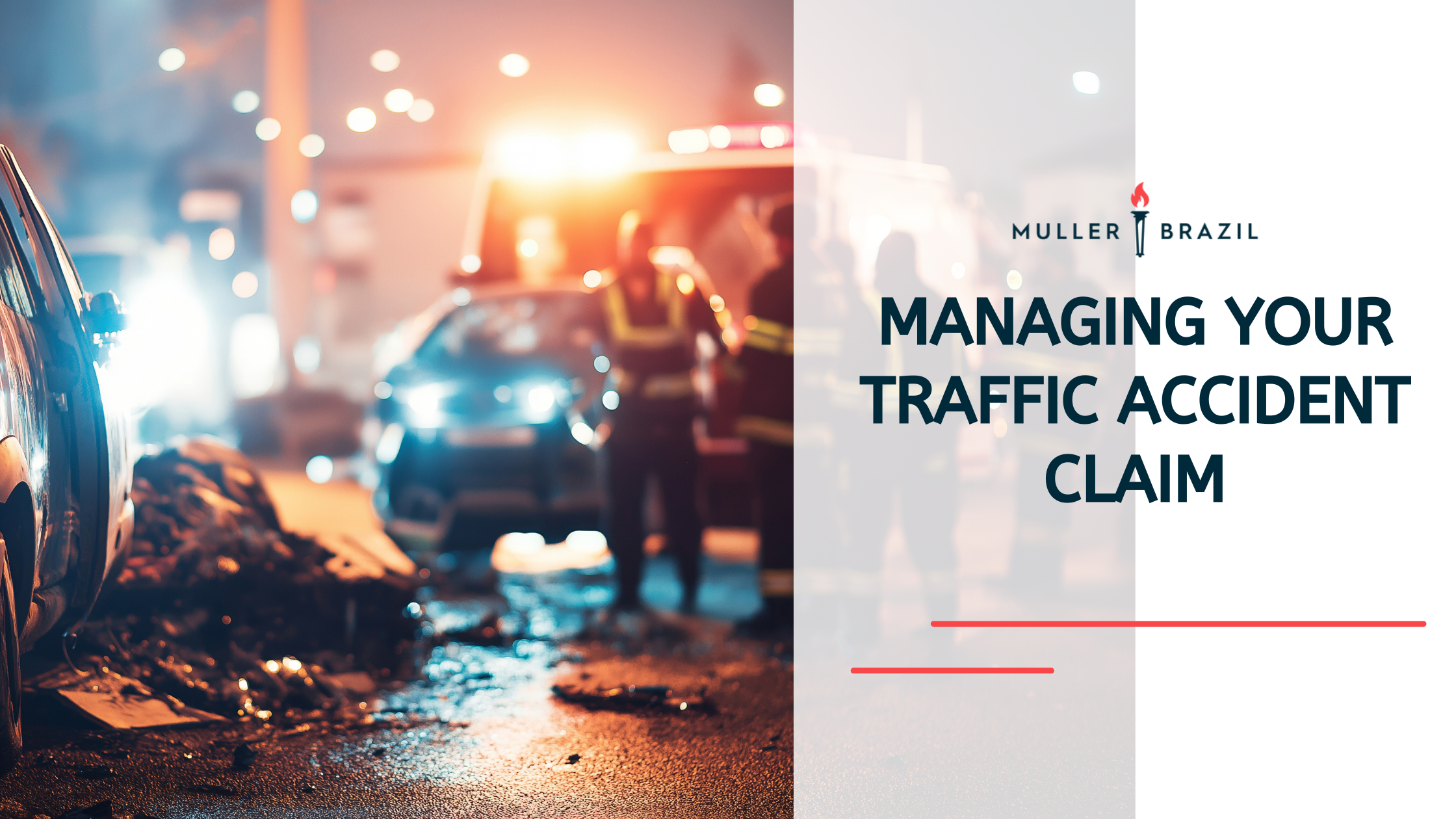One moment, you're driving like any other day. Next, you're dealing with the chaos of a crash—damaged car, medical bills piling up, lost wages, and an insurance company that seems more interested in minimizing payouts than helping you recover.
Insurance claims are supposed to make things easier, but too often, they create more frustration. What if your claim is denied? What if the adjuster low balls your damages? What if the other driver’s insurance refuses to pay? These aren’t just legal questions—they’re real fears that can leave you feeling powerless.
At Muller Brazil, we understand that behind every claim is a person trying to put their life back together. That’s why we’re here—to help you navigate the claims process, fight back against unfair insurance tactics, and make sure you don’t get left with the financial burden of someone else’s mistake.
Let’s walk through exactly what to do after a car accident, how to handle tricky insurance adjusters, and when to take legal action to protect your rights. If your claim is delayed, denied, or undervalued, we’ll show you how to fight back—and win.
How Does the Claims Process Work?
The claims process begins as soon as the accident occurs and continues until your insurance company processes your claim and determines fault. While every case is different, most insurance policies follow a similar process.
What Should You Do Immediately After an Accident?
- Move to a safe location – If possible, pull your vehicle out of traffic to prevent further damage and reduce risk to others.
- Call emergency services – If there are injuries or significant vehicle damage, contact 911. A police report can be valuable when filing a claim with your insurer.
- Exchange information – Collect the other driver’s name, phone number, insurance policy number, insurance company name, and vehicle registration details. If there are other drivers involved, get their details as well.
- Document the accident scene – Take photos of the vehicles involved, weather conditions, hidden damages, and any road hazards that may have contributed to the crash.
- Contact your insurance company – Report the accident as soon as possible to begin the claims process. Be prepared to provide details, including the police report, photos, and information about the other party.
What Happens After You File a Claim?
Once you report the accident, your insurance company assigns an insurance adjuster to investigate the case. The adjuster will:
- Review the accident report and assess who is responsible
- Inspect your vehicle damage to determine repair costs
- Consider your insurance coverage, policy limits, and deductibles
- Arrange for a rental car if you have rental reimbursement coverage
Throughout this process, stay in contact with your insurance agent to track the status of your claim and understand what steps are required.
Do You Have the Right Insurance Coverage?
Understanding your insurance policy is important when managing a car accident claim. The type of coverage you have will determine how much your insurance company will pay for vehicle repairs, medical expenses, and other losses.
What Are the Different Types of Auto Insurance Coverage?
Most insurance policies include a combination of the following:
- Liability Coverage – Covers damages to the other party if you are found at fault in the accident. This includes bodily injury and property damage liability.
- Collision Coverage – Pays for vehicle repairs or replacement, regardless of who caused the accident. The actual cash value of your vehicle will determine the payout if your car is declared a total loss.
- Comprehensive Coverage – Covers vehicle damage caused by events other than a collision, such as theft, vandalism, fire, or weather conditions.
- Rental Reimbursement Coverage – Helps pay for a rental car while your vehicle is being repaired after an accident.
- Uninsured/Underinsured Motorist Coverage – Protects you if the other party does not have insurance or does not have enough to cover the repair costs and medical expenses.
How Do You Know What’s Covered?
After an accident occurs, review your policy limits, deductibles, and exclusions. If you’re unsure whether your insurance company will cover specific repair costs or provide a rental vehicle, contact your insurance agent for clarification.
How Is Fault Determined After an Accident?
Determining fault in a car accident is a key part of the claims process. Your insurance company and the other party’s insurer will investigate to decide who is responsible for the damages. This determination affects whether your insurance policy covers the costs or if the other driver’s insurance must pay.
How Do Insurance Companies Determine Fault?
An insurance adjuster will review several factors, including:
- The police report – Officers at the accident scene will document drivers involved, vehicle damage, weather conditions, and any traffic violations.
- Statements from the drivers and witnesses – The insurance company will consider accounts from all drivers involved and any witnesses.
- Vehicle damage and repair estimates – The location and extent of vehicle damage help determine how the accident occurred.
- Traffic laws – If one driver violates traffic laws, they may be found at fault.
- Photos and videos from the accident scene – Visual evidence, such as dashcam footage or surveillance video, can help establish liability.
What If You Are Partially at Fault?
Some states follow comparative negligence laws, meaning you may still recover damages even if you were partially responsible for the accident. However, your compensation may be reduced based on your percentage of fault.
For example, if you are found 20% responsible and your total damages are $10,000, your compensation may be reduced to $8,000. Understanding these laws is essential when filing a claim or negotiating a settlement.
How Does Pennsylvania Handle Fault in Car Accident Claims?
Pennsylvania has a unique approach to car accident claims because it follows a "choice no-fault" system. This means that drivers choose between no-fault insurance (limited tort) and traditional fault-based insurance (full tort) when they purchase their policy.
Here’s what that means for your claim:
- Limited Tort (No-Fault Insurance) – Your own Personal Injury Protection (PIP) coverage pays for your medical bills and certain out-of-pocket expenses, regardless of who caused the accident. However, you cannot sue the at-fault driver for pain and suffering unless you suffer a serious injury (such as permanent disfigurement or disability).
- Full Tort (Traditional Fault-Based Insurance) – You retain the right to sue the at-fault driver for all damages, including medical expenses, lost wages, and pain and suffering, without restrictions.
Who Pays for Damages in a Pennsylvania Car Accident?
Even in a no-fault system, liability still matters. Pennsylvania uses comparative negligence, meaning if you are partially at fault, your compensation is reduced by your percentage of fault. If you’re more than 50% responsible, you cannot recover damages from the other driver.
If your insurance company or the other driver's insurer is denying your claim or offering a low settlement, understanding your legal options is key. At Muller Brazil, we help Pennsylvania accident victims navigate fault disputes, insurance denials, and lowball settlement offers—so you can get the compensation you deserve.
How Do You Handle Vehicle Repairs After an Accident?
Once fault is determined, the next step is getting your vehicle repaired. Whether your insurance company or the other driver’s insurer is responsible for covering the repair costs, understanding your rights in the repair process is important.
What Are Your Options for Vehicle Repairs?
- Choose a repair shop – You have the right to select your own repair shop, even if the insurance company recommends one.
- Understand repair estimates – The insurance adjuster will assess the vehicle damage and provide an estimate for repair costs. If you disagree with the amount, you may request an appraisal provision for a second opinion.
- OEM vs. after-market parts – Some insurance policies only cover after-market parts instead of original equipment manufacturer (OEM) parts. If you prefer OEM parts, check your policy limits or negotiate with the insurer.
- Hidden damages – Some vehicle damage may not be visible right away. A competent appraiser can help ensure all necessary vehicle repairs are included in the claim.
What Happens If Your Car Is Declared a Total Loss?
If the repair costs exceed the actual cash value of your vehicle, the insurance company may declare it a total loss. In this case:
- The insurer will offer a settlement based on the actual cash value of your vehicle before the accident occurred.
- If you disagree with the total loss value, you can challenge the appraisal or provide evidence of your vehicle’s market value.
- If your new vehicle is financed or leased, you may still owe money on your loan, which gap insurance can help cover.
Will Insurance Cover a Rental Vehicle?
If your car is in the shop, you may need a rental vehicle. Some insurance policies include rental reimbursement coverage, which helps pay for a rental car while your vehicle is being repaired. Check your policy or ask your insurance agent about coverage limits and time restrictions.
What Should You Do If Your Claim Is Delayed or Denied?
Even when you follow all the right steps, your insurance company may delay processing your claim or even deny it outright. Common reasons for delays and denials include:
- Disputes over fault – The insurer may argue you were partially or fully responsible.
- Missing documentation – Lack of a police report, repair estimates, or medical records can slow down processing.
- Lowball settlement offers – The insurance adjuster may undervalue your vehicle damage or medical expenses.
- Claim filing errors – Even small mistakes in the claims process can lead to delays.
If your claim is delayed or denied, you have options:
- Request a detailed explanation from your insurance company in writing.
- Submit additional evidence (such as photos, medical bills, or repair estimates).
- Challenge an unfair settlement by negotiating or filing an appeal.
- Consult an attorney if the insurer is acting in bad faith or refusing to pay what you're owed.
Get Help Today
Need Help With an Insurance Dispute?
Managing the claims process can be frustrating, especially when dealing with insurance disputes, denied claims, or low settlement offers. Insurance companies often prioritize their profits, leaving accident victims struggling to recover repair costs, medical expenses, lost wages, and other damages.
At Muller Brazil, we advocate for accident victims, ensuring they receive the full compensation they are entitled to. Our legal team can help if:
- The insurance adjuster is undervaluing your vehicle damage or declaring your car a total loss unfairly.
- You’re being blamed for an accident you didn’t cause.
- The insurance company is delaying or denying your claim without valid reasons.
- Your medical expenses or lost wages are not being properly reimbursed.
With our experience handling car accident claims, we know how to challenge unfair insurance decisions and negotiate better settlements for our clients.
How Can an Attorney Strengthen Your Claim?
Many accident victims don’t realize they have legal options when their insurance company offers a low settlement or refuses to cover certain damages. An attorney can:
- Gather and present evidence to strengthen your case.
- Challenge unfair fault determinations that could reduce your payout.
- Ensure your settlement accounts for all losses, including hidden damages, medical bills, rental car expenses, and lost wages.
- Take legal action if the insurer engages in bad faith practices.
Having a legal team on your side can make the difference between a fair payout and getting shortchanged.
Get a Free Consultation With Muller Brazil
If you’re struggling to resolve your claim or feel like your insurance company isn’t treating you fairly, don’t wait. The sooner you take action, the stronger your case will be.
Contact Muller Brazil today for a free consultation. Call 215.885.1655 or email info@mullerbrazil.com to discuss your case!
Meet the Author
Paul Brazil - Founding Partner
Paul Brazil is a native of Dunmore, Pennsylvania and a graduate of Dunmore High School. For his undergraduate education, he attended Bloomsburg University where he majored in political science. He then went on to earn his JD from Widener University School of Law. Following graduation from law school, Mr. Brazil worked at a large Philadelphia civil defense firm where he litigated workers’ compensation claims and Heart and Lung Act cases.
Learn more about Paul Brazil ⇒





